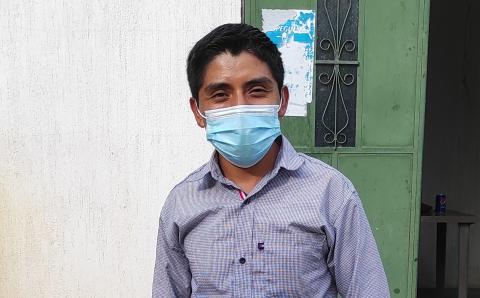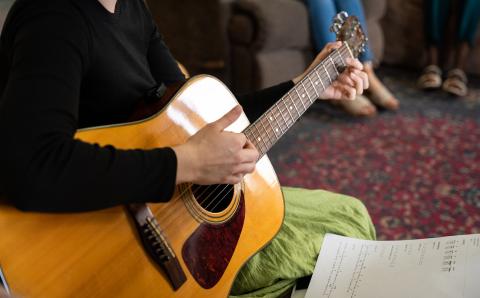Editor’s note: This is the first-place winner of The Banner’s 2024 Young Adults Writing Contest.
I knew Liz only briefly.
When I first met her, she was crumpled over a worn-out walker, leaning up against the outer stone wall of the church drop-in center where I work. Her back was arched in a way that made it impossible to see her face. It was only when I knelt that I was able to see her eyes. I can’t remember our conversation or what I said, but somehow our brief interaction turned into a moment of prayer, her hands in mine, accepting any hope I had to offer.
I went to Liz’s memorial today. In the days since our first prayer together, I’ve come to understand that Liz was deeply known and loved in our community. She had been living on the streets for decades and had been battling cancer a good part of that time. If anything, the service was a celebration of her final homecoming to Christ. One might say it was a family reunion for Christ’s peacemakers, all gathered in the upstairs sanctuary of the same drop-in center where I first met Liz. It was a place where, in her honor, we could laugh and weep together. It was a gathering for people who feel and understand the weight of mourning, yet choose to cling to hope and justice regardless.
The service was led by one of the church’s pastors, a weathered man with piercings, tattoos, and an uncanny knack for singing the blues. He’s been walking alongside our downtown community for more than a decade. I’m certain he’s seen more than a lifetime’s worth of death and suffering in that time. Yet there he was, talking about Liz finally meeting God face to face and finally finding home, and acting as Christ’s peacemaker from the stage.
An outreach worker was sitting in the pew in front of me. I recognized her from a video I’d shared on social media a few months prior. She had called for protest when city leaders attempted to pass a bill prohibiting encampments in our downtown square. It had been the middle of winter, with harsh Canadian temperatures at their coldest. I remember weeping as she pleaded for understanding, for empathy, acting as Christ’s peacemaker in the midst of injustice.
A coworker was sitting next to me, tears dropping down her cheeks, falling onto her lap into soft puddles. She had just recently stepped away after working at the church for a number of years. She was one of those people who knew Liz intimately. There are few people I know who feel as deeply as her, even fewer who have the courage to keep loving so deeply despite the loss they have witnessed. Oh, if anyone is a picture of Christ’s peacemaking, it is her.
In the basement of the church, below the sanctuary where we remembered Liz, was a collection of Christ’s peacemakers in action: volunteers and staff operating our drop-in center, just as they do every other day. People who know that we can’t survive without one another. They know that our community needs us, just as we need them.
And the people in our community, spread throughout upstairs pews and downstairs tables, are Christ’s peacemakers too. They share meals with one another and bring in flowers and notes and smiles. They share their joys and burdens, things that feel far too heavy for one person to ever bear, yet they push through and offer their stories. They’ll accept prayer when it’s offered, placing their hands in mine, just as Liz did long ago.
Liz certainly wasn’t the first of our community to die. She won’t be the last either. There is an ever-growing memory tree on the wall in our drop-in center. Painted on the branch and trunk are hundreds of leaves with the names of people who have passed away. Occasionally, people stop and add a name or two. Sometimes four or five names go up at once. Our long-time staff know almost every name on that wall. They’ve shared coffee with people and celebrated birthdays and baptisms. They’ve heard their stories, sought justice with them. To me, this is what it means to make peace, to be Christ’s peacemakers in today’s fractured world.
There is no better example of a peacemaker than that of Christ himself, the Prince of Peace. Jesus Christ, who came into our broken world as an infant, embodying the full fragility of humanity. Jesus, who sought out the lame and the blind and the hurting. Jesus Christ, who went out of his way to meet the woman at the well. Jesus, who wept at the tomb of his good friend.
No, Jesus did not come into this world to set himself apart in such a way as not to feel the pain that comes with humanity, to not witness every way in which sin has fractured our world. He chose relationship. He chose to live among us, to eat and walk and breathe with us. He chose to commune with us in the midst of our pride and sin and heartbreak. In making peace, he rejected indifference. He pursued love endlessly, ensuring that this broken world is not our forever home.
Who greater to celebrate this than Liz, who was resilient in her life, full of courage and selfless faith, even in what seemed like an endless pursuit of home? Liz chose kindness and goodness and refused to let hope die, all in the name of the Jesus who said, “Blessed are the peacemakers,” calling them “children of God.”
I have a picture in my mind of another family reunion, this one far away from all the sin and pain and mourning of our fractured world. In it is Liz, cancer gone, back no longer bent, finally meeting God face to face. His arms are stretched open wide in anticipation, but his words come out in a soft whisper:
Daughter, welcome home.
About the Author
Madelyn Vandermeer, 19, is a student at the University of British Columbia, where she studies addiction science. She has spent her past two summers working in downtown Guelph, Ont., particularly with Royal City Mission. She is a member of Bethel Christian Reformed Church in Acton, Ont.









